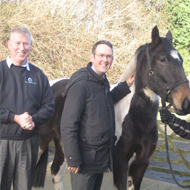
MP and charity call for laws to tackle fly grazing
The number of horses at risk of neglect or abandonment in England and Wales, has risen to 7,000, World Horse Welfare has warned.
Before Christmas, work by welfare charities had led to a reduction in the number of at risk horses to 6,500 – but a New Year review by World Horse Welfare has seen that figure shoot back up again.
Welfare charities operate horse and pony rescue centres – but nearly all of their 2,800 spaces are full.
World Horse Welfare says there has been a sharp rise in at risk horses over the past five years, as a result of over breeding coupled with a collapse in the value of horses, with some being sold for as little as £5.
It says around half of the horses at risk are being fly-grazed, the illegal practice of placing horses on land without permission. This is often on verges, playing fields or farmland and causes risks to both the animal and public safety, as well as problems for landowners, local authorities, police and communities.
John Cunningham, North West Field Officer for World Horse Welfare met with Paul Maynard, MP for Blackpool North and Cleveleys, to discuss the issues surrounding the number of at risk horses.
“One of the reasons why fly grazing has proliferated is because it is so easy to get away with," said Mr Cunningham.
"The benefits to perpetrators far outweigh any risks, especially costs to the perpetrator.
"One dealer recently convicted of animal cruelty is thought to have over 2,000 horses being fly grazed across the country, which are frequently moved between sites. All these could become the responsibility of local authorities or animal welfare groups at any time - but the present law makes taking pre-emptive action almost impossible.”
He said the vast majority of fly grazed horses cannot be traced to an owner. The only option then is for local authorities to confiscate the horses, microchip and passport them, then put them into auction, where they can be bought at low value with no guarantee that the problems will not start all over again.
Mr Maynard said there are more than 100 at risk horses in his constituency.
"My concern is not only for the horses, but for the communities and local authorities in this region that may, at any time, find themselves having to deal with abandoned horses. This could cause safety issues for the people within my constituency and costly damages for local landowners," he said.
“Clearly owners need to start taking responsibility for their animals – but without better laws to address fly grazing and an enforceable way to link horse to owner this problem isn’t going to go away anytime soon.
"I would like to encourage those within my constituency to do their bit for these horses at risk by rehoming instead of buying a horse to make vital space for another that so desperately needs it."
He said he will now write to Defra to discuss measures to ease the "horse crisis."
The charity meanwhile is calling on the Government to follow the lead of its Welsh counterparts who are due to discuss new legislation that will allow for the immediate removal of fly grazed horses.
Chief Executive of World Horse Welfare, Roly Owers says: “This is a commendable and necessary action from Wales that could have negative repercussions for England if it does not follow suit.
"Our concern is that some of the thousands of horses currently fly grazing in Wales could simply be moved over the border into England.
“Recently we met with Defra ministers on this very issue and we were advised that the Localism Act might have a role in addressing the problem and we are currently looking into this to see how it can be used in practice.
"This needs to be clarified as a matter of urgency. Fly grazing was debated in Westminster Hall before Christmas and MPs across all parties, from all over the country, spoke about the problems that fly grazing is causing in their constituencies and it’s clear they want a better way to tackle it.”
The charity is urging people to email Defra calling for action. For more click here.
Image courtesy of World Horse Welfare



 The Federation of Independent Veterinary Practices (FIVP) has announced a third season of its podcast, Practice Matters.
The Federation of Independent Veterinary Practices (FIVP) has announced a third season of its podcast, Practice Matters.